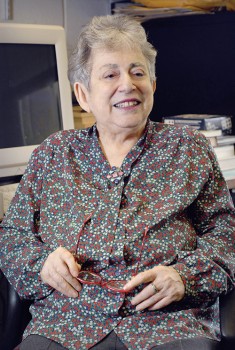Faculty Friends: Catching Up with former Professor Fay Ajzenberg-Selove

Former Professor Fay Ajzenberg-Selove
Details
Fay Ajzenberg-Selove is a pioneer in science. She was one of country's first female physicists, and was the first tenure-track female professor hired at Haverford, where she taught from 1957-1970 before moving on to the University of Pennsylvania. Now retired and living in Wynnewood, Pa. with her husband, fellow scientist Wally Selove, Ajzenberg-Selove was honored with the 2007 National Medal of Science (presented by the National Science Foundation) in September. Here, the author of A Matter of Choices: Memoirs of a Female Physicist (Rutgers, 1994) shares her memories and experiences with Haverford Magazine:
How did you come to the United States as a teenager?
I was born in Berlin of Russian parents; at least, they considered themselves Russian although technically they were Polish. Then, Dad went bankrupt in Germany and we moved to France and stayed there for 10 years. He paid his debts and became an industrialist, and was a millionaire once again. He almost lost it all when the Germans came in, but then through a great deal of luck and with my help (I spoke not only Russian but also French and English, because I had had lessons) we got out and went to Spain and Portugal. Then in order to immigrate, we went to Cuba at the time of Battista. We were lucky to be awarded immigration visas, and we landed [in the U.S.] with a hundred bucks between the four of us. Dad went to work, because there was no money waiting, and before his death he was a millionaire once again. His integrity was absolute; he is certainly the biggest influence on me, although then [Caltech professor] Tom Lauritsen and my wonderful husband also became my heroes.
How did you become interested in science?
My father was an engineer and he didn't have a son, so he decided I would be an engineer. I adored him, so my first degree was in engineering. Then I decided I preferred physics, so I switched…it was more fun. Also, at the time in engineering I could only have been a draftswoman, and I hated drafting!
In many of your science classes, you were one of the only (if not the only) woman. What was that like for you?
It was fine. The guys were terrifically nice to me, and taught me how to swear like a stevedore. They treated me as a sister. Because of them, I always felt very comfortable with men.
What was your experience like as Haverford's first full-time female professor? What was the atmosphere at the time?
The students were outstanding; in fact I'm still in touch with many of them. One of my students (Curt Callan '61) is going to be the new president of the American Physical Society, and has been chair of the department at Princeton for eons. There were lots of fabulous students; I loved it.
I didn't have all that much interaction with the professors. They were more political than I was…it was also the time of the Vietnam War and all that.
What did you enjoy most about teaching?
It's emotional. I love to seduce kids into liking physics.
Tell us about your research on light nuclei and the elements of stars.
I worked for 38 years on book-length papers (one a year) on these nuclei. I started out working with Tom Lauritsen at Caltech. He was a wonderful man; I worked with him until his death and then I continued our work alone. Also, whenever I saw that there was something missing in our knowledge of light-and-medium-weight nuclei, I would call a friend who had the right kind of accelerator and I would go down for a day to expose the photographic plates I used at the time, and then take them back to Haverford and scan them and write a paper together with the accelerator fellow.
What was your reaction to winning the National Medal of Science?
I was amazed. And then I found out who had nominated me: several of my old students at Haverford (Bill Forman '69 and his wife, both prominent astrophysicists) and Boston University. That was particularly pleasant.
How would you describe today's environment for women in science?
Considering that it was zero for many years, it's much better now! Of course it's not perfect. I am a feminist, and I want opportunities for both men and women, according to their interests and abilities and luck; luck has a lot to do with it too.



